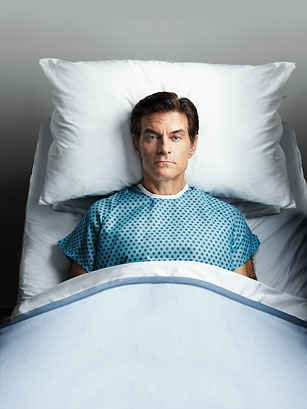
(4 of 4)
This second polyp, which worried me more than the first, turned out to be hyperplastic and not precancerous. This was good news, of course, but the fact that I had had a polyp at all did mean I would have to be vigilant for the rest of my life. I will probably be at little risk of dying from colon cancer — but only as long as I faithfully show up for periodic testing and continue to use a capable gastroenterologist who can meticulously do the procedure.
Getting Smart
Those colon-cancer numbers are likely to keep me on the straight and narrow from now on. But it was an awfully close call. Why did I almost blow it?
It was while I was sitting in my office's waiting room before the second test, watching a half-dozen patients pacing back and forth thinking many of the same anxious thoughts I was thinking, that I finally had the epiphany. The reason so many otherwise rational people don't screen themselves for disease is not that they don't understand the risks — they do. And it's not even that they believe they're somehow immune from disease or death. We all grasp that in a primal way from the time we're very small. But even as we age, death still seems somehow remote — something that will happen at some vaguely later time and that we'll deal with it in some hard-to-fathom way. It's that distance that helps us cope with the idea of our mortality.
What we can grasp much more clearly — and what we dread much more immediately — is the world-jolting way a bad medical diagnosis will affect us today. Our lives get complicated fast, and we are very uncomfortable being uncomfortable. We detest the passage into the unknown — that feeling of being out of control, victimized. Numbers like 75% or 6% or 50-50 are abstract and conceptual. The sickly, swoony feeling you get when your doctor says, "Come see me in my office," is something we can all imagine today. And so we avoid the test to avoid that experience — and that was precisely the choice I had made.
In hindsight, I recognize that the universe had to drill through three distinct layers of arrogance (or denial) as it changed my perspective on cancer and cancer screening. First, I was cavalier going into my initial screening. I was healthy, and I knew the statistics, and I figured the risks didn't apply to me. Second, I felt that decades of research and experience that led to the prep-and-testing guidelines as we know them also didn't apply to me. And last, I felt that the follow-up was somehow a formality and the risk still didn't apply to me. The transformation from Dr. Oz to a modest, wiser Mr. Oz did not become complete until I was staring directly at a pathology report.
So am I satisfied with the results of my birthday-boy bravado? Well, I have learned to embrace the uncertainty and terror that we all experience as we confront threats to our health. I will perhaps fear bad news a little less and will thus show up for screenings more willingly in the future. I am surely pleased that what I learned will help me manage a disease risk that might otherwise have killed me. So, if a newly modest me can still be immodest enough to offer advice: Learn from my mistakes.
The goal, I now know better than I did before, is not to be the perfect patient but simply to be as good a patient as you can be. Many of you have not had any kind of cancer screening in a decade or more. Please know that it's often not too late for a clean medical slate and that even if something is detected, it's better to find it sooner rather than later. The fact that you have never had a screening or have failed to keep up with the appropriate schedule has no bearing on the karma of cancer, but it has an enormous bearing on the outcome.
Most important, my colonoscopy wasn't entirely about me. It was about my wife and our children. It's about our someday grandchildren. It's about my childhood friends whose lives remain closely intertwined with mine. It's about my colleagues and patients at the hospital who teach me as I learn from them. I need to be there for all these people I know and care about. I need to show up in my own life. And you need to show up in yours. Sometimes that requires courage — the courage to undergo a colonoscopy or Pap smear or mammogram or chest X-ray. It's not easy, but it could save your life. And if it helps even a little, remember that I will be rooting for you.
x